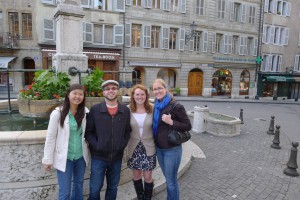‘No ideas but in things’
– William Carlos Williams, American poet

Caroline Kirby, 2012-2013, Switzerland (far right), with fellow Fulbright U.S. Students (left to right) Kun-Wei, Tevor, and Caitlin in Geneva’s Old Town. (Photo credit: Adam Duker)
I took a metaphorical page from William Carlos Williams’ book when I started my life in Geneva, Switzerland. Instead of reading about the region’s culture, while a full-time student at Université de Genève, I experienced it in the banal and quotidian. And as a result, I learned to consider the needs and preferences of others before my own.
I discovered that certain concepts like punctuality and work-life balance are expressed much more elegantly on paper than they are experienced in daily life. The locked doors of lecture halls and offices, for example, shamed my American tendency to arrive ‘fashionably late’ for events and appointments. And the sanctity of Sunday, when most shops and libraries remain closed, disrupted my typical seven-day-week rhythm of productivity.
I also saw the lofty notion of compromise embodied in everyday local practices. Trams, cars and bicycles respect reserved lanes and stop lights. Official documents contain at least three languages (German, French, and Italian) to accommodate the language preferences of Swiss citizens. And French and German language television networks temporarily exchange newscasters to express appreciation for the language of others.
These efforts, at once plainly obvious and creatively crafted, embody the spirit of solidarity that binds together four languages, twenty-six cantons and numerous political parties into one powerful Swiss Confederation. As the traditional motto goes: Unus pro omnibus, omnes pro uno — One for all, all for one. In Switzerland, compromise is a thing of beauty and power.
Compromise also lives at the heart of the Fulbright Program, which is oriented by a vision to increase mutual understanding between the people of the United States and the people of other countries. My project in particular focused on engagement between Muslim-majority and Muslim-minority societies. I studied attempts by European merchants to understand ‘the Orient’ and to communicate their perceptions in their countries of origin. As an active participant in a graduate travel literature research group, I examined merchant-traveler Jean Baptiste-Tavernier’s representations to French readers of 17th-century court life in the Ottoman, Safavid and Mughal empires. Because of his willingness to accommodate unfamiliar mores, I discovered, Tavernier demonstrates a more nuanced understanding of his surroundings than his contemporaries, and largely succeeds in facilitating a more accurate understanding of an exotified culture.
I have sought to mirror the brilliance of Tavernier in my own depiction of Geneva, by focusing on particular instances when my personal preferences disappeared into Genevois norms. Ultimately, these experiences enriched my life in the United States. Now that I’ve returned home, I’ve found an early or on-time arrival is an effective gesture of respect to an event’s host, and that a restful Sunday makes the entire week more productive.
To present and future scholars endowed with the Fulbright mission, I encourage you to surrender some of your preferences in uncomfortable and frustrating ways and to step outside yourself long enough to understand and respect the preferences of others. This is the art, and the power, of compromise.
Do you have questions for Caroline? Connect with her on Twitter @carolinemkirby.


1 Comment
I appreciate your way of finding a relation between Swiss “compromise” and Fulbright’s goal to enhance understanding among peoples.
Best,
Waqar